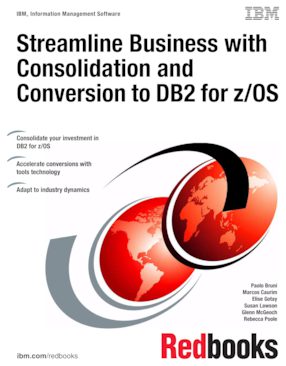
Published on 26 September 2012, updated 05 November 2014
Read in Google Books Order hardcopy
Share this page:
ISBN-10: 0738437123
ISBN-13: 9780738437125
IBM Form #: SG24-8044-00
Authors: Paolo Bruni, Marcos Caurim, Elise Gotay, Susan Lawson, Glenn McGeoch and Rebecca Poole
Abstract
Time to market, flexibility, and cost reduction are among the top concerns common to all IT executives. If significant resource investments are placed in mature systems, IT organizations need to balance old and new technology. Older technology, such as non-IBM pre-relational databases, is costly, inflexible, and non-standard. Users store their information on the mainframe and thus preserve the skills and qualities of service their business needs. But users also benefit from standards-based modernization by migrating to IBM® DB2® for z/OS®. With this migration, users deliver new application features quickly and respond to changing business requirements more effectively.
When migrating, the main decision is choosing between conversion and re-engineering. Although the rewards associated with rebuilding mature applications are high, so are the risks and customers that are embarking on a migration need that migration done quickly.
In this IBM Redbooks® publication, we examine how to best approach the migration process by evaluating the environment, assessing the application as a conversion candidate, and identifying suitable tools.
This publication is intended for IT decision makers and database administrators who are considering migrating their information to a modern database management system.
Table of Contents
Part 1. Introduction
Chapter 1. Business considerations
Chapter 2. Converting to DB2 for z/OS
Part 2. Migration methodology
Chapter 3. Application and database conversion methodology
Chapter 4. Automated conversion methodology
Chapter 5. Application and database conversion best practices
Chapter 6. Choosing a migration strategy
Part 3. Tool-assisted conversions
Chapter 7. Conversion solutions
Chapter 8. Converting CA IDMS to DB2 for z/OS
Chapter 9. Converting Adabas to DB2 for z/OS
Part 4. Post-conversion tasks
Chapter 10. z/OS and DB2 setup
Chapter 11. Application and SQL tuning
Chapter 12. Maximizing DB2 for z/OS features
Appendix A. IBM Information Management Services Migration Practice
Appendix B. Additional material